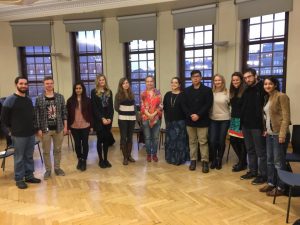We, the signatories, would like to express our disagreement with the Finnish government’s proposal for the introduction of tuition fees for students coming from outside the EU/EEA.
The introduction of fees at the University of Helsinki concerns students attending and applying for the international master’s degree programmes. Therefore, while many of our arguments apply to international students as a whole, a direct comparison between the experiences of universities and universities of applied science is not possible. Below we outline the main arguments for why we oppose the introduction of tuition fees.
One of the main arguments of those in favour of tuition fees is the claim that since international students do not stay in Finland, their education should not be funded by the state. Contrastingly, research shows that a large number of foreign students intend to stay in Finland. Some of the reasons why foreign students do not end up staying in Finland include the lack of job opportunities, and discrimination in the labour market; however, such a situation need not be the case.
Another point seen in favour of tuition fees is acquiring more funds for the higher education institutions. This argument, however, is also flawed. The introduction of fees would result in fewer students choosing Finland for their higher education destination. Those who are able to pay would choose universities with higher rankings and a longer history of incoming international students, such as universities in the UK and the United States of America. Therefore, Finland’s current niche has been to attract talent that would not otherwise study abroad. In addition, administrative costs would also require sufficient funding, which is unlikely to be paid off from tuition revenues anytime soon. Moreover, the increased focus on marketing and developing the international programmes would turn attention away from the needs and development of domestic education. Finally, the government’s suggested scholarship scheme would lead to more students receiving money rather than paying it. The proposed change is likely to bring more expenses, rather than revenues, in the near future.
Then, there is an idea that tuition fees somehow signal the true quality of the education provided. There is however, no guarantee that the fees actually reflect the quality of education. At a time when the government is increasingly cutting from the higher education sector, how can students be assured of the quality of the education they are paying for? Already now there is a lack of teaching, and students have to take book exams to complete their studies. As stated before, the introduction of fees is unlikely to bring any extra revenue to improve the “service” international students are paying for. In addition, if the quality or quantity of teaching acquires negative publicity internationally, it would be hard to attract fee-paying students.
In our opinion, having an education system without tuition fees is a far better alternative, both from an economic and social standpoint. International students already pay for their living expenses here, adding to, rather than taking from, the national economy. Furthermore, if they are able to stay, they more than pay back their education in taxes. To enable them to stay, we would therefore have to invest in more efficient handling of document procedures (such as applying for the renewal of a residence permit), enhancing job opportunities and the overall integration into Finnish society, and fighting discrimination in all its forms.
Another issue to concentrate on in the free system is language. Learning Finnish is difficult, but with good teaching it is not impossible to learn. Having internationalization, which is not exclusively in English, Finland would set a new and unusual example. If fees were introduced, English would have to be offered an equal status in the university, resulting in more resources being taken away from Finnish and Swedish teaching and investment in further translations. It is impossible to charge fees and keep almost all of the university life in Finnish.
In conclusion, more research is needed about who international students in Finland are, and how they can contribute to Finnish society. However, the above points already show that the introduction of tuition fees is not an experiment we want to “give a go”.
This statement is signed by the following organisations and persons:
Tsemppi, the organization for international and internationally-minded students and researchers at the University of Helsinki
CISSI, Orgnisation for International Social Scientists, University of Helsinki
Skald rf, the subject organization for students in the Master’s programme for Culture and Communication, University of Helsinki
Svenska Studenters Agro-Forst förening r.f., the organisation of Swedish-speaking students at the Faculty of Forest and Agriculture

